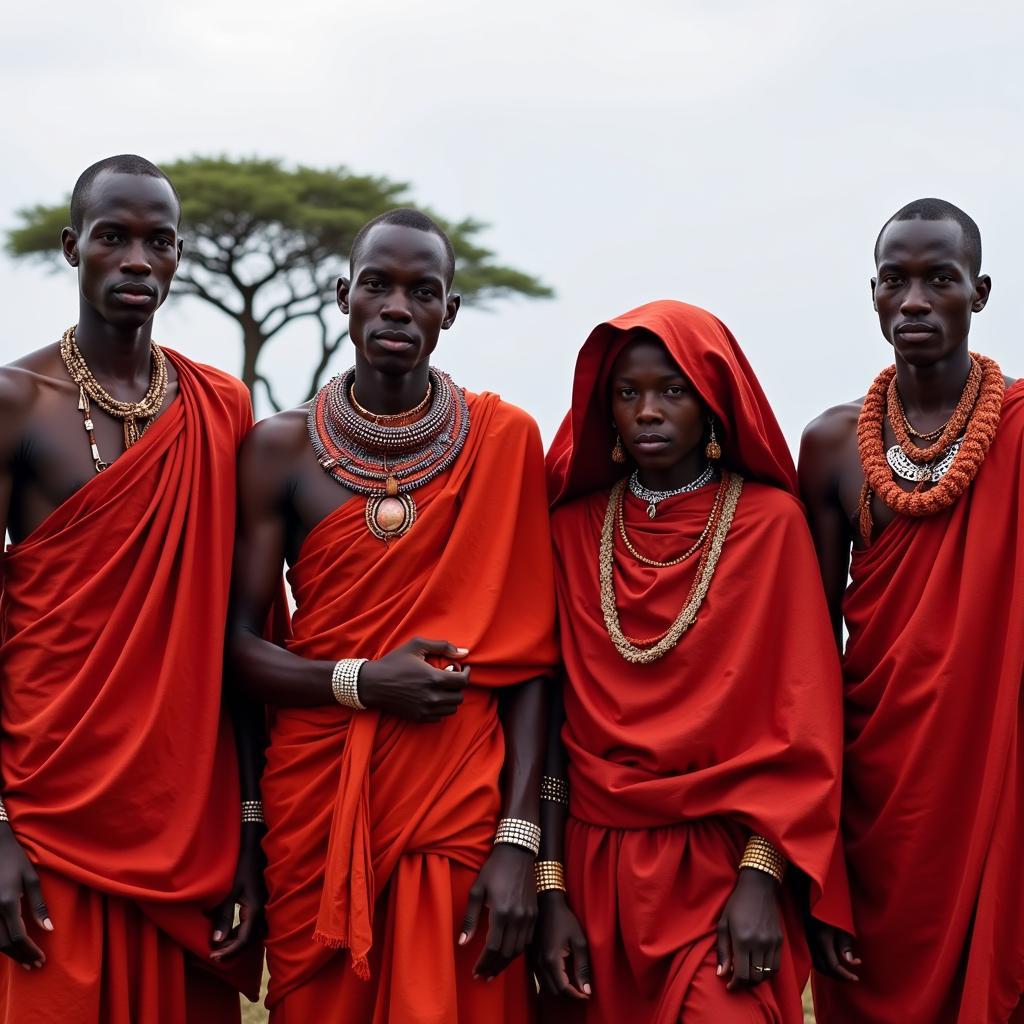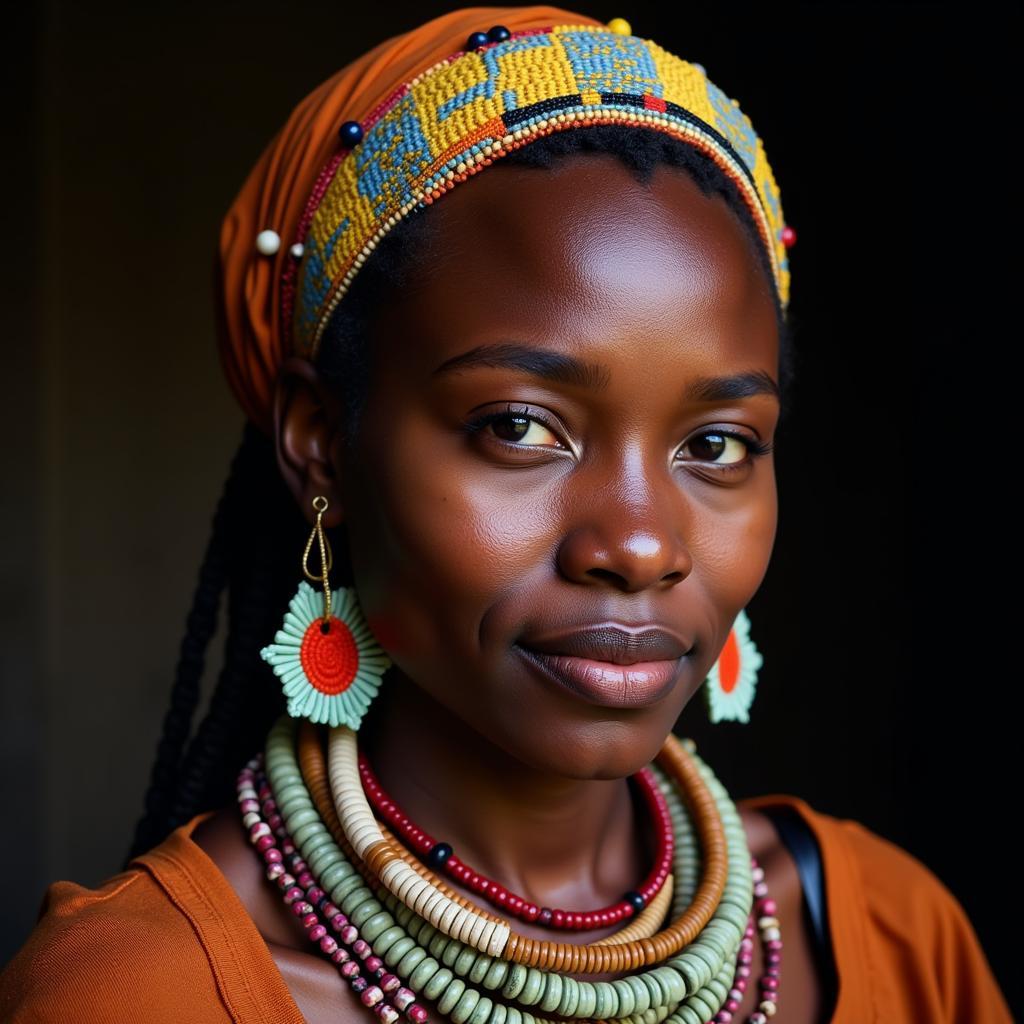African Colors Meaning: A Vibrant Tapestry of Culture and Symbolism
Africa, the birthplace of humanity, pulsates with a vibrant energy reflected in its diverse cultures and traditions. Among its most captivating elements are the African Colors Meaning, which hold deep significance far beyond their visual appeal. These colors are woven into the very fabric of African Life, conveying profound messages in spirituality, celebrations, art, clothing, and everyday objects.
Unveiling the Language of African Colors
To truly understand African color psychology, one must delve into the context of their application. For instance, while specific colors might hold universal meanings, their interpretation can vary significantly between different regions and ethnic groups.
Red – The Color of Life, Death, and Power
Red, a color intrinsically linked with vitality, holds a powerful presence in African symbolism. It often represents life, blood, and the ancestral connection. However, it can also symbolize danger, death, and sacrifice. In some cultures, red ochre is used in burial rituals, signifying the cycle of life and death.
 Maasai Warriors in Traditional Red Shuka
Maasai Warriors in Traditional Red Shuka
White – Purity, Spirituality, and Ancestral Wisdom
Across many African cultures, white embodies purity, spirituality, and the realm of ancestors. It is often associated with peace, goodness, and light. During traditional ceremonies and rituals, white attire signifies reverence and spiritual connection.
Black – Power, Mystery, and the Feminine Essence
Black often represents power, mystery, and the unknown. It is associated with the earth’s fertility, the night sky, and the feminine energy of creation. Black can also symbolize age, wisdom, and the ancestors who have passed into the spiritual realm.
Green – Prosperity, Growth, and Harmony with Nature
Green, the color of lush vegetation, embodies abundance, growth, and harmony with nature. It is often linked to prosperity, good health, and well-being. Many African cultures view green as a symbol of hope, renewal, and the interconnectedness of all living things.
Yellow – Wealth, Royalty, and Spiritual Illumination
Across the continent, yellow signifies wealth, royalty, and spiritual enlightenment. It is often associated with the sun’s golden rays, representing warmth, energy, and the divine. Yellow is frequently used in traditional ceremonies and festivals, symbolizing joy, celebration, and abundance.
Blue – Peace, Communication, and the Vastness of the Sky
Blue, reminiscent of the sky and water, often represents peace, tranquility, and open communication. It can also symbolize truth, trust, and loyalty. In some cultures, blue is associated with the divine, representing the vastness of the heavens and the spiritual realm.
The Significance of Colors in African Art and Clothing
The symbolic meanings of colors are prominently displayed in African art, textiles, and clothing. For example, the intricate patterns and vibrant hues of Kente cloth from Ghana tell stories of history, philosophy, and cultural beliefs. Similarly, the colorful beaded jewelry worn by many ethnic groups often conveys messages about social status, family lineage, or spiritual beliefs.
“Colors are the lifeblood of African art. They are not merely decorative but an integral part of the storytelling process, conveying layers of meaning and symbolism that connect the past, present, and future,” says Dr. Amina Sow, a renowned expert on African art and textiles.
Exploring the Nuances of African Color Symbolism
Understanding African beads meaning colors adds another layer of understanding to the continent’s rich cultural tapestry. From the vibrant red coral beads signifying protection and vitality to the deep blue indigo beads symbolizing wisdom and spirituality, each color adds to the narrative.
 African Woman Wearing Colorful Beads
African Woman Wearing Colorful Beads
You can learn more about the fascinating world of African flags meaning and download high-quality images of African flags in alphabetical order on our website. This resource will provide you with a deeper appreciation for the symbolism and history embedded in each flag.
Conclusion: Embracing the Rich Tapestry of African Colors
African colors meaning offer a captivating glimpse into the continent’s soul. By understanding the cultural context and symbolism behind each hue, we gain a deeper appreciation for the rich traditions, beliefs, and artistic expressions that make Africa so unique. As we explore the language of African colors, we embark on a journey of discovery, uncovering the stories, history, and vibrant spirit of a continent bursting with life.
FAQ
1. What does the color gold represent in African culture?
Gold often symbolizes wealth, royalty, and spiritual enlightenment, representing the sun’s warmth and divine energy.
2. Do the meanings of colors vary between different African countries?
Yes, while some color interpretations are widespread, specific meanings can differ significantly based on regional and ethnic variations.
3. Why is red often used in both celebrations and funerals?
Red holds a dual symbolism in many African cultures, representing both life and death, highlighting the cyclical nature of existence.
4. Where can I learn more about the meaning of colors in specific African cultures?
Resources like books on African art, textiles, and cultural studies, as well as museums and cultural centers, can provide more in-depth information.
5. How can I incorporate the beauty and symbolism of African colors into my life?
Exploring African art, fashion, and design, and learning about the meanings behind different colors, can be a beautiful way to appreciate and incorporate these elements into your life.
Need Help?
For any assistance or inquiries, please contact us at:
Phone Number: +255768904061
Email: kaka.mag@gmail.com
Address: Mbarali DC Mawindi, Kangaga, Tanzania.
Our dedicated customer support team is available 24/7 to assist you.

